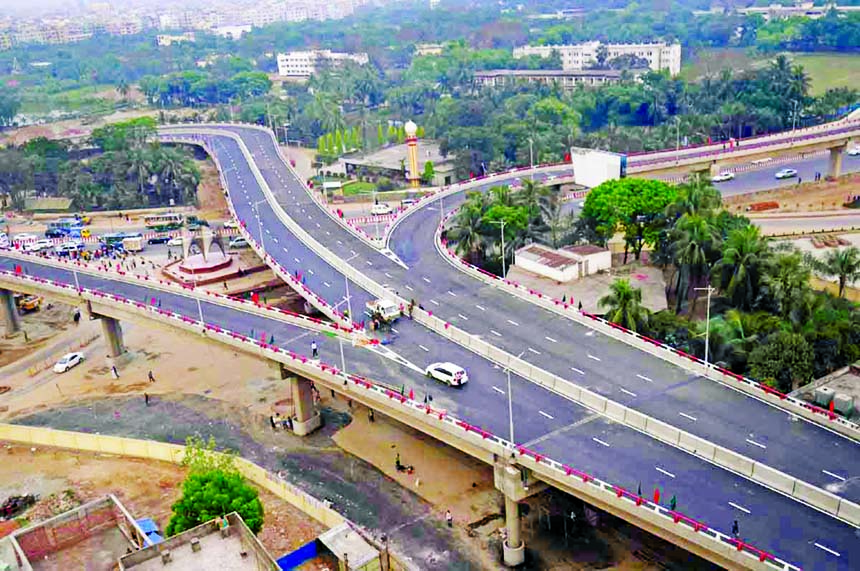
Kamruzzaman Bablu :
Four state-owned banks fear to incur loss for their investment of Tk 2,150 crore in the Mayor Hanif flyover, the first PPP (public private partnership) project in Bangladesh. The reason creates this kind of risk as there is no expected traffic movement over it.
This infrastructure project has been implemented completely through PPP in Bangladesh for the first time. The 11.7km-long flyover, Bangladesh’s longest, was fully opened from July 2014.
The contractor has, however, already rescheduled the loans twice and missed its targeted payout time by three years, citing increased costs and low income.
The banks claimed so far there has been no monitoring of the contractor’s cost estimations or the earnings from the flyover.
Four banks and two financial institutions invested Tk 2,250 crore in the flyover, starting in 2010. They are state-owned Sonali Bank, Janata Bank, Agrani Bank, Rupali Bank, Investment Corporation of Bangladesh (ICB), and private Social Islami Bank.
The four state banks lent the lion’s share of the total amount, Tk 2,150 crore.
The amount was disbursed from 2010 in three phases. The contractor company was supposed to pay the dividend of the first phase from 2013. But the banks have not got any dividend against their investment so far.
Agrani Bank invested a total of Tk500 crore of which Tk200 crore was given as bridge loan, which has already expired. Although the bridge loan was classifiable as bad debt, the bank did not classify the loan as of December 2014, the central bank investigation found.
The total dues of Orion Infrastructure to Agrani Bank stood at Tk 704.73 crore as of December 2014, which was 32.84 percent of the total paid up capital of the bank. The investigation report said the loan was very risky as it exceeded the single borrower exposure limit of 15 percent of paid up capital.
Moreover, the loan was given to the director of Orion Infrastructure, who owns two companies that have already defaulted on loans from Agrani Bank.
The investigation report advised the bank management to intensify efforts to recover the loan and investment from the Mayor Hanif Flyover.
Soon afterwards, Bangladesh Bank classified the investment of the banks, as the contractor did not pay the dividend income it had committed to pay within the given period. But the influential contractor later had the loans rescheduled twice, once in January 2015 and then in January 2016.
As per the second rescheduling, the contractor will pay interests and regular dividends from 2017.
Sonali Bank has invested Tk500 crore, Janata Bank Tk600 crore and Rupali Bank Tk550 crore in the flyover.
The banks invested in the flyover against fully convertible preference share at 10 percent dividend rate, fully redeemable preference share at 15 percent dividend rate and bridge finance against proposed public issue at 16% dividend rate.
The project contractor Orion Infrastructure Limited urged the banks to reduce the dividend rate that was set against the investment as well as to increase the payment period of the principle amount.
Following the contractor’s application, the banks revised the plan of the dividend rate and payment period taking approval from Bangladesh Bank.
The new dividend rate was reset at 10 percent against convertible preference share, 12 percent against redeemable preference share and bridge finance. The dividend accumulated until 2014 will be paid from January 2019 to December 2024 as per the new plan.
In its proposal to the banks, Orion Infrastructure claimed that two factors – price hike of construction materials and delay in starting the construction work – had badly affected the viability of the project.
Moreover, only 20 percent of the traf- fic floor – the area on the flyover usable by vehicles – was being used because of four bypass roads under the city corporation. These roads had not been shut down as planned. As a result, toll collection was lower than expected, according to the company.
A senior executive of Sonali Bank said the project should be reviewed by the government as the contractor was claiming higher costs incurred than the project’s estimated cost. There was no monitoring of the actual cost and the income, the executive said.
“The government ultimately may have to take over the project, otherwise banks will never get back their investment,” the executive said.

